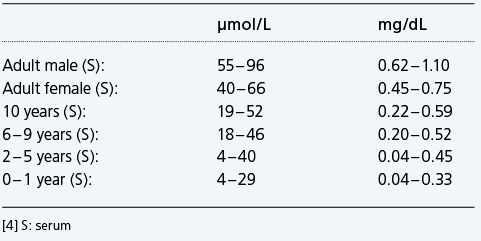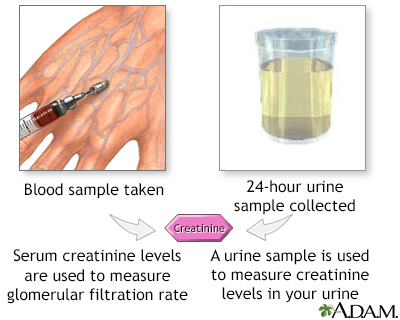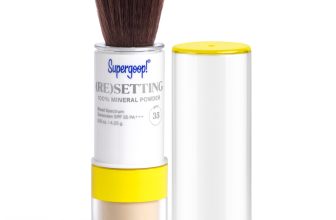Serum Creatinine Normal Range
The normal range for serum creatinine levels is 0.84 to 1.21 milligrams per deciliter. Serum creatinine levels are a key indicator of kidney function.
Serum Creatinine Normal Range Understanding what constitutes a normal range for serum creatinine can provide valuable insights into an individual’s kidney health. Maintaining healthy levels of serum creatinine is essential for proper kidney function and overall well-being. Regular monitoring of serum creatinine levels can help in early detection of any potential kidney issues and enable timely intervention.
By staying within the normal range, individuals can promote optimal kidney health and prevent complications associated with kidney dysfunction. Let’s explore in more detail the significance of serum creatinine levels and why it is important to maintain them within the normal range.
Introduction To Serum Creatinine
Serum creatinine is a crucial indicator of kidney function, and understanding its normal range is essential for monitoring renal health. In this section, we will delve into the basics of serum creatinine, including what it is, its sources in the body, and the significance of its normal range.
What Is Creatinine?
Creatinine is a waste product produced by the muscles as they work. It is derived from creatine, a substance involved in energy production in muscles. Creatinine is transported through the bloodstream to the kidneys, where it is filtered and excreted in urine. The level of creatinine in the blood is a reflection of the body’s muscle mass and kidney function. Elevated creatinine levels can indicate impaired kidney function, while low levels may be indicative of a low muscle mass or other health conditions.
Sources Of Creatinine In The Body
The primary source of creatinine in the body is the normal breakdown of muscle tissue. Additionally, dietary intake of meat can contribute to creatinine levels. As a result, creatinine levels can vary based on muscle mass, age, gender, and dietary habits. Understanding the sources of creatinine helps in interpreting the significance of its levels in the body and its normal range.
Importance Of Creatinine Measurement
Role In Kidney Function
Creatinine is a waste product produced by muscles and excreted by the kidneys. Its measurement is crucial for assessing kidney function. Abnormal levels can indicate kidney disease or impaired kidney function.
Creatinine And Health Monitoring
Regular creatinine testing is vital for monitoring the progression of kidney disease and the effectiveness of treatment. It also helps to identify conditions that can affect kidney function, such as high blood pressure and diabetes.
Normal Range Of Serum Creatinine
The normal range of serum creatinine is approximately 0. 84 to 1. 21 milligrams per deciliter for adult males and 0. 74 to 1. 07 milligrams per deciliter for adult females. This test measures kidney function and helps diagnose conditions related to the kidneys.
Serum creatinine is a substance that is produced by the muscles and is filtered out of the blood by the kidneys. The normal range of serum creatinine in the blood is an important indicator of kidney function. Knowing the normal range of serum creatinine can help doctors diagnose and treat kidney-related conditions.
Factors Affecting Normal Values
Several factors can affect the normal range of serum creatinine in the blood, such as age, gender, and muscle mass. For example, men tend to have higher levels of serum creatinine than women due to their typically higher muscle mass. In addition, certain medications and medical conditions can cause a temporary increase or decrease in serum creatinine levels.
Variations By Age And Gender
The normal range of serum creatinine can vary depending on a person’s age and gender. Generally, the normal range of serum creatinine for adult males is between 0.6 and 1.2 milligrams per deciliter (mg/dL), while the normal range for adult females is between 0.5 and 1.1 mg/dL. However, these ranges can vary depending on the individual’s age and overall health.
| Age Group | Normal Range of Serum Creatinine (mg/dL) |
|---|---|
| 0-17 years | 0.3-1.2 |
| 18-59 years | 0.6-1.2 (male), 0.5-1.1 (female) |
| 60+ years | 0.6-1.3 (male), 0.5-1.2 (female) |
It’s important to note that the normal range of serum creatinine can vary slightly depending on the laboratory that is performing the test. Therefore, it’s essential to discuss any abnormal test results with a healthcare provider to determine if further testing or treatment is necessary. In conclusion, understanding the normal range of serum creatinine is crucial for monitoring kidney function and diagnosing related conditions. Factors like age, gender, and muscle mass can affect the normal range of serum creatinine, and variations by age and gender should be taken into account when interpreting test results.

Factors Influencing Creatinine Levels
Factors influencing creatinine levels play a crucial role in understanding one’s kidney function. Various elements can impact the levels of creatinine in the blood, providing valuable insights into overall health.
Dietary Influences
Eating protein-rich foods can elevate creatinine levels due to increased breakdown in the body.
Muscle Mass Impact
Individuals with higher muscle mass tend to have higher creatinine levels as muscles produce creatinine.
Medications And Creatinine
Certain medications like antibiotics or chemotherapy drugs can affect creatinine levels in the body.
High Creatinine Levels
Serum creatinine normal range is crucial for monitoring kidney function. High creatinine levels indicate potential kidney issues. Regular tests help maintain levels within the healthy range.
High creatinine levels in the blood can indicate potential health issues.
Potential Causes
Symptoms To Watch For

Low Creatinine Levels
Serum creatinine normal range is crucial for assessing kidney function. Low creatinine levels may indicate underlying health issues. Monitoring within the normal range is essential for proper kidney function evaluation.
Low creatinine levels can indicate an underlying health condition that needs attention. Creatinine is a waste product produced by muscles and filtered by the kidneys. A low serum creatinine level can be a sign that there is an issue with the muscles or the kidneys. The normal range for creatinine is 0.6 to 1.2 mg/dL for men and 0.5 to 1.1 mg/dL for women. In this section, we will discuss the underlying causes and possible health implications of low creatinine levels.
Underlying Causes
Low creatinine levels can be caused by various factors, including:
- Malnutrition
- Reduced muscle mass
- Liver disease
- Pregnancy
- Low protein intake
- Hyperthyroidism
- Dehydration
In some cases, low creatinine levels may be due to medications such as antibiotics and steroids. It is essential to consult a doctor to determine the underlying cause of low creatinine levels.
Possible Health Implications
Low creatinine levels can have several health implications, which include:
- Impaired kidney function
- Malnutrition
- Muscle weakness
- Liver disease
- Increased risk of infections
- Increased risk of mortality
Impaired kidney function is the most common health implication associated with low creatinine levels. The kidneys’ ability to filter waste products from the blood can be compromised, leading to the accumulation of toxins in the body. This can cause several health problems, including kidney damage and failure. In conclusion, low creatinine levels can indicate an underlying health condition that requires attention. It is essential to consult a doctor to determine the underlying cause and possible health implications of low creatinine levels.
Testing For Creatinine
Testing for creatinine is an important part of monitoring kidney function and overall health. Serum creatinine levels are a key indicator of how well the kidneys are functioning, and testing for creatinine is a common practice in both routine check-ups and diagnostic evaluations.
Types Of Creatinine Tests
There are two primary types of creatinine tests: blood tests and urine tests. Blood tests, such as the serum creatinine test, measure the level of creatinine in the blood, while urine tests, like the creatinine clearance test, assess the amount of creatinine that is filtered out of the blood and excreted in the urine.
Preparing For A Creatinine Test
Prior to a creatinine test, it is important to inform your healthcare provider about any medications, supplements, or herbal remedies you are taking. Some substances can affect creatinine levels, so your healthcare provider may advise you to discontinue certain medications or supplements before the test. It is also essential to remain well-hydrated, as dehydration can influence creatinine levels.
Maintaining Healthy Creatinine Levels
Maintaining healthy creatinine levels is essential for overall health. Understanding the serum creatinine normal range helps in monitoring kidney function effectively. Keeping creatinine levels within the recommended range is crucial for optimal well-being.
Maintaining Healthy Creatinine Levels Serum creatinine is a waste product produced by the muscles and excreted by the kidneys. Maintaining healthy creatinine levels is essential for overall kidney function and general well-being. Keeping serum creatinine within the normal range is crucial to ensure that the kidneys are working optimally. Let’s explore some key factors that can help in maintaining healthy creatinine levels.
Diet And Lifestyle Choices
A balanced diet and healthy lifestyle play a vital role in managing creatinine levels. Consuming a diet rich in fresh fruits, vegetables, and lean proteins can help support kidney health. Additionally, limiting the intake of sodium, processed foods, and sugary beverages can contribute to maintaining healthy creatinine levels.
Regular Health Check-ups
Regular health check-ups are crucial in monitoring serum creatinine levels and overall kidney function. Routine visits to a healthcare professional can help detect any deviations from the normal range early on, allowing for timely intervention and management. Moreover, these check-ups enable individuals to stay informed about their health status and make necessary adjustments to their lifestyle or treatment plans. Incorporating these strategies into daily life can go a long way in ensuring that serum creatinine levels remain within the normal range, promoting optimal kidney function and overall well-being.

Frequently Asked Questions
What Level Of Creatinine Is Concerning?
A concerning level of creatinine is generally above 1. 3 mg/dL for women and 1. 5 mg/dL for men.
What Serum Creatinine Level Indicates Kidney Damage?
A serum creatinine level above 1. 2 mg/dL may indicate kidney damage. Regular monitoring and consultation with a healthcare professional are important for managing kidney health.
What Is High Creatinine Levels High?
High creatinine levels indicate potential kidney problems or reduced kidney function. It’s essential to consult a doctor for proper evaluation and management.
What Is A Poor Creatinine Level?
A poor creatinine level indicates potential kidney issues. Low creatinine levels may result from muscle loss or impaired kidney function, requiring further medical evaluation.
Conclusion
Understanding serum creatinine normal range is vital for monitoring kidney health. Maintaining levels within the range is crucial for overall well-being. Regular check-ups and a healthy lifestyle play key roles in managing and optimizing kidney function. Stay informed and proactive for better health outcomes.







